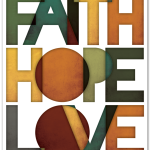Faith, Reason, and God: A Socratic Dialogue
by Dr. Peter Kreeft
Filed under Faith

NOTE: This fictitious dialogue takes place between two friends, Chris, a Catholic, and Sal, a sincere skeptic, and centers on some basic questions here at Strange Notions regarding faith, reason, and the existence of God.
Sal: Chris, before we go any further in our conversations about Christianity, I have to ask you a very basic question.
Chris: Ask away.
Sal: Do you think this is going to get us anywhere, arguing about religion?
Chris: What you mean by "arguing"?
Sal: Fighting with words.
Chris: I don't want to do that. We're friends, not enemies. What I mean by "arguing" is just "giving reasons".
Sal: Trying to prove something, right?
Chris: Yes.
Sal: Well, I'm not sure that's going to get us anywhere either.
Chris: Neither am I, but I'm not sure it isn't, either. So if there's a chance, let's take it. Let's try.
Sal: Why?
Chris: If a lot of people say a great prize is behind a door, should you try to open it, or not?
Sal: You should, but what does that have to do with arguing?
Chris: The prize here is the truth about God and the meaning of our lives, whatever that truth may be. That's what we're both committed to, isn't it?
Sal: Truth, yes.
Chris: And isn't that valuable, like a prize?
Sal: Yes, if we ever find it.
Chris: Shouldn't we try? Shouldn't we knock at the door?
Sal: What's the door?
Chris: Honest dialogue. Looking for reasons.
Sal: Reasons to believe?
Chris: Yes. Or not to believe.
Sal: I don't think it'll work. I don't think you can reason your way into religion.
Chris: Oh, neither do I. But you might reason your way to the place where you can believe - like walking to the beach, and then swimming. Walking to the beach is like reason and swimming is like faith. You have to go to the place where you can swim before you can swim. And you have to go to the place where you can believe before you can believe.
Sal: You mean you have to prove it first by reason before you can believe it?
Chris: No, not at all. But I think it's your reason that's holding you back from believing. I think your reason is asking some good questions that no one has ever answered for you.
Sal: That's true.
Chris: So if we can find the answers to those questions, we can at least make faith possible for you. Then it's up to you, of course.
Sal: I see. You agree, then, that religious faith is a matter of personal choice.
Chris: Of course.
Sal: But reason and logic isn't the way we usually make personal choices. Therefore it's not the way to make the choice about religious faith.
Chris: That sounds like pretty good logic, Sal. Let's examine your argument. What do you mean by a "personal choice"?
Sal: What's right for one person can be wrong for another.
Chris: I see. You mean things like getting married or not, or deciding on a career, or how to spend money.
Sal: Right. There's no one right way for everybody.
Chris: But religion isn't like those things, Sal.
Sal: I thought you agreed it was a personal decision.
Chris: I did. But it claims to tell you something that's true for everybody. What's personal is your response to it.
Sal: What do you mean, "true for everybody"? What religious things are true for everybody?
Chris: Things like God and Heaven - whether they're true or not doesn't depend on you, or on your personal choice, any more than the sun does.
Sal: But if I believe it's true, then it's true for me, and if I don't then it isn't true for me.
Chris: Do you think that believing something makes it true?
Sal: True for me, yes.
Chris: But really true? Objectively true?
Sal: There's no objective truth. Truth is subjective.
Chris: Really?
Sal: Yes.
Chris: Truly?
Sal: Yes.
Chris: I don't think so. Am I wrong? Is this a truth I don't see?
Sal: Yes.
Chris: An objective truth, then. It's an objective truth that there is no objective truth.
Sal: Oops.
Chris: And you were so logical a minute ago!
Sal: Wait a minute. We're talking about religious truth. That's subjective.
Chris: You mean nobody can be right or wrong about religious truth?
Sal: Right.
Chris: Except you?
Sal: What do you mean?
Chris: You first said nobody can be right or wrong about religious truth. Then you assumed you were right about religious truth when you said it isn't objective.
Sal: You're tangling me up in my words.
Chris: No I'm not. You said it yourself. You tangled yourself up. You contradicted yourself.
Sal: Well, what I mean to say is that nobody can prove whether there really is a God or not.
Chris: Oh, but that's a different question, whether anybody can prove it. Surely God might exist without your proving it. Plenty of things exist that you can't prove, don't they?
Sal: Like what?
Chris: Like the fact that I'm thinking about the color yellow now. Or the fact that I honestly care about you. Can you prove those things?
Sal: No.
Chris: Then things can be true without our proving them.
Sal: Yes.
Chris: So God might be true even if we couldn't prove him.
Sal: O.K., but we can't prove him. No one can settle religious questions. So I think it's a waste of time to argue about them.
Chris: I see. And why do you think no one can settle religious questions?
Sal: I just think so, that's all.
Chris: You have no reasons to think that?
Sal: Sure I do.
Chris: I think you can guess what my next question is going to be.
Sal: You mean, what are my reasons?
Chris: Good guess.
Sal: Well, you can't prove God like you can prove other things, like galaxies and germs and scientific stuff.
Chris: You mean you can't use the scientific method.
Sal: Right.
Chris: And you think the scientific method is the only way to prove anything.
Sal: Really to prove anything, yes.
Chris: Can you prove that?
Sal: What?
Chris: What you just said: that the scientific method is the only way to prove anything.
Sal: Hmmm. I guess not.
Chris: Then you contradict yourself again. You say you should believe something only if it's proved scientifically, yet you believe that even though it isn't proved scientifically.
Sal: Pretty clever.
Chris: No. I'm not trying to be clever. I'm trying to show you that your faith in science isn't scientific. It's a faith.
Sal: Let me ask the questions for a minute.
Chris: All right.
Sal: Do you think there are other ways to prove things besides the scientific method?
Chris: Yes.
Sal: And can you guess what my next question is going to be?
Chris: "What are they?"
Sal: Yes. What are they?
Chris: Common sense, experience, intuition, insight, reasoning, and trustable authority. We use everything we have to look at all the evidence.
Sal: And how do you know which of those methods to use?
Chris: You use the method that fits your subject matter. You don't use the scientific method to understand people you love, for instance, any more than you use love to understand math or chemistry.
Sal: What do you use for God?
Chris: He's a person, so you use the method that fits persons: love and faith.
Sal: That's naive. Unscientific.
Chris: But it's right for persons. Look. Science is rightly critical and distrustful. It accepts nothing until it's proved. Nature treated as guilty until proven innocent, so to speak. But people are innocent until proven guilty. If we treated people the way science treats nature, we'd never understand them. The only way to understand them is to trust them, not to distrust them. And to love them.
Sal: Just shut your eyes and believe, eh?
Chris: No. Open your eyes and believe.
Sal: But "love is blind."
Chris: Not real love. Real love sees the other person's inside, like an X-ray.
Sal: But sometimes it makes mistakes. Sometimes you trust somebody and he lets you down. Trust doesn't always pay.
Chris: But it's a chance worth taking, isn't it? To live without loving anyone, without trusting anyone - that would be Hell, wouldn't it?
Sal: Yes.
Chris: Worse than being let down, wouldn't it?
Sal: I guess so.
Chris: Well, it's the same with God. It would be even worse never to try him, never to trust him at all, never to give him a chance, than to trust him and then be let down. But he won't let you down.
Sal: So you say.
Chris: I'm not asking you to believe it because I say it. I'm asking you to test it, like a good scientist. Faith is like an experiment. It's testable, like trusting a human being. Life is like a laboratory, and loving someone - whether a human being or God - is like an experiment. It's something you do, and you learn by doing.
Sal: I see. It either works or not.
Chris: Yes.
Sal: But I have to have reasons for doing this experiment of believing in God because you're asking me to put myself in the test tube. It's not a light little thing.
Chris: I'm glad you see that. It's not a little thing at all. All right, let's look at some reasons for believing in God next time.
Sal: O.K.
Related Posts
Note: Our goal is to cultivate serious and respectful dialogue. While it's OK to disagree—even encouraged!—any snarky, offensive, or off-topic comments will be deleted. Before commenting please read the Commenting Rules and Tips. If you're having trouble commenting, read the Commenting Instructions.












